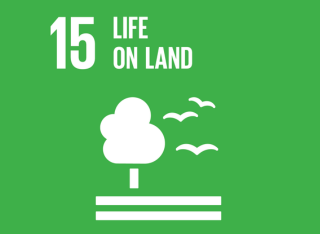
Biodiversity
Nestled amongst the rolling hills of the Surrey countryside, our campus is a beautiful, leafy environment, with carefully designed gardens, vibrant green playing fields and a picturesque lake.
Free public access to green spaces
The University has allowed free public access to our site since 2008, with members of the public taking part in open days, graduation ceremonies, annual events, such as our free festival and our 5k and 10k runs, as well as our lecture series.
Our campuses have been recognised internationally as green spaces of significance, home to a variety wildlife, trees and flowers. We take pride in sharing our beautiful sites with the local community, and will continue to provide free information about nature on-site.
Key successes
The University continues to put local biodiversity first - from being a peat-free campus, to implementing our award-winning garden waste recycling scheme, creating mulch to enrich and protect soil. A Biodiversity Plan (docx) has been developed to ensure the University continues to improve biodiversity on our campuses. Other successful measures we have taken include:
- Installing eighty upcycled bird boxes across campus in time for the bird nesting season.
- Implementing a new irrigation system which has saved 100 hours of work.
- Transitioning towards the use of electric vehicles and equipment by the Grounds team to save fuel and reduce noise and disruption.
- Replacing the oak board edging of a pond on our Stag Hill campus to prevent water waste.
- Creating unmown grassland areas during Spring and Summer, mowing them on a rotational basis during Autumn to minimise the impact to the wildlife that reside in them. During 2023-2024, biodiversity surveys in these areas showed an increase in number of pollinators.
Biodiversity Baseline & Auditing
The University has undertaken a baseline review of its Biodiversity with the help of Surrey Wildlife Trust (SWT). The baseline review has identified a range of environments ranging from chalk downland and agricultural use, to a variety of aquatic environments (stream, lake and ponds) and deciduous woodland.
In terms of Biodiversity Net Gain the estate has been given an overall rating of 383.49 across its 3 main sites (Stag Hill, Manor Park and the Research Park.
The Horticulture Team, along with Ecologists from the Bioscience Department and Sustainability are carrying out audits on an annual basis, using FIT counts, pitfall traps as well as specific environment surveys. Bird counts will also be done during the Spring.
In the coming months further log piles will be installed to encourage insects (stag beetles are present), along with bat and swift boxes. The SWT baseline study also recommends action to take to improve Biodiversity further, including bird boxes, types of planting and pond steps across our sites. All will be considered during the coming year (2025/2026).
Water Conscious Planting
Criterion around planting landscapes.
We have a proactive approach to the criteria around planting landscapes and maintaining our historical amenity landscape areas. We plan our landscapes to produce and ecologically enhance the campus, whilst reducing inconvenience and nuisance to those who use our site - i.e. avoid mild nuisance that may come from plants, shrubs and trees being too close to living areas and interfering with the community's normal use across our campus.
Drought-tolerant plants:
Plants that require more water are placed on the North and West elevations of the building - North to minimise evaporation and West as this is our prevailing rain direction. Plants that require less water and are more drought tolerant are selected and planted on the South and East elevations.
Adding our own produced soil ameliorants enhances the quality of the soil and improves plant health to aid in times of drought. We produce our own ameliorants as compost and our own produced wood chip as a mulch, to aid the loss of evaporation following the rainfall in the Winter and Spring months.
Optimising tree cover:
Working towards maximising the tree canopy cover that the site can reasonably support, within the obvious constraints, has both local and wider benefits. This can be achieved through a structured new tree planting programme, and the proactive management of the existing trees to favour those with the best potential. This is being achieved by a different mowing regime and minimising the number of mows and producing an enhanced habit area. The greater the tree canopy, the lower the ground temperature and this has the potential to lower evaporation daily rates on hot sunny days.
Choosing plants, shrubs and trees:
We choose plants, shrubs and trees that are tolerant of their growing conditions, taking into consideration their growing aspect - whether this be windy, dry, wet, soil type and location on campus.
Aesthetic considerations are considered along with the ecological enhancement. We use the RHS plant list to encourage the use of species and cultivars of flowering plants that produce pollen and subsequently the production of nectar. These plants are perfect for pollinators to provide year-round interest, and for adding invertebrates into the environment.
Aquatic environments
The University estate has 7 ponds, a brook, cascade and other aquatic environments that it proactively manages. This involves the maintenance of marginal plants (like reed mace), litter picking, monitoring water levels and condition both during the Summer and Winter, plus health checks of the wildlife.
This management results in habitats that support:
- Birds - Moorhens, Egyptian and Canada Geese, Herons, Ducks
- Amphibians - Common Frogs and Toads, Smooth Newts
- Fish - Tench, Roach, Common Rudd, Carp and Perch
- Insects/invertebrates - Water fleas, Blackworms and Copepods.
Guildford in Bloom
We are pleased to have received medals in the Guildford in Bloom competition, celebrating the diversity of our campus on several occasions. Most recently, our Grounds team won Gold in the Nature Champion Category (2024). The award celebrated the team's conservation work on Manor Park Campus.
Previous awards include:
- Silver in the Best Site for Nature Conversation Category, for the fantastic campus lake, which boasts a wealth of wildlife and plant species.
- Physics PhD student Daisy Shearer won Gold and Best in the Student Showcase Category (2019) for her quantum garden, located in Guildford Park Avenue, which featured a ‘path to quantum computing’, with paving stones engraved with scientific breakthroughs.
Community projects
We support various community groups across Guildford through education on issues related to biodiversity.
In collaboration with Surrey Wildlife Trust and Guildford Borough Council, a series of workshops have been held with the local community to understand how investing in the world’s natural assets and green spaces can lead to sustainable enhancements to quality of life.
The University’s Global Centre for Clean Air Research also ran interactive community workshops with local residents. The sessions allowed participants to identify problem areas near schools, playgrounds, hospitals and near busy roads, where the use of green infrastructure such as hedges could improve the air quality.
We have collaborated with Silent Pool Gin to present an anti-stress garden at the RHS Chelsea Flower Show. This exciting collaboration saw the University partner the premium gin brand, acclaimed Surrey-based garden designer David Neale and Dutch horticultural pioneers Plant-e, to explore plant technologies that encourage wellbeing. Through their combined expertise, the team created a sustainable oasis of calm for visitors to enjoy.
Find out more about our community engagement.
Sustainable Development Goals
Our work to improve biodiversity at the University tackles two of the UN Sustainable Development Goals.

